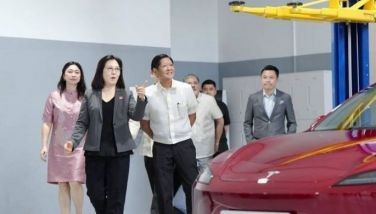BSP completes forex liberalization program
February 26, 2007 | 12:00am
After relaxing its rules on foreign exchange purchases, the Bangko Sentral ng Pilipinas (BSP) said it is not looking into further reforms in the immediate future.
Although the BSP said its regulatory framework is being reviewed periodically, BSP Governor Amando M. Tetangco Jr. told reporters that for now, the BSP was done with its liberalization efforts.
According to Tetangco, any immediate moves in relation to foreign exchange policies are likely to merely simplify the BSP’s existing rules.
"We’re still looking at the rules and if there is an opportunity to liberalize and make markets more efficient, then we will take further measures in the future," Tetangco said. "But for now, we are done."
Tetangco said the BSP took steps to further liberalize its rules on foreign exchange in order to provide a regulatory environment that he said was more responsive to the changing economy.
"The steps we have taken are in consideration of the expansion of the economy both in terms of trade and non-trade transactions," he said. "It needed to be done and we think this is the right time to do it."
The market was expecting the BSP to take further steps to liberalize its foreign exchange regulations but Tetangco said all other aspects of the BSP’s policy framework are under review, with no particular priority focus.
After liberalizing the rules on foreign exchange purchases, Tetangco said the market would have to adjust itself to the new regime.
"These reforms just reflected our effort to allow our policy framework to catch up changing requirements of the expanding economy but we also expect it to spur more growth over the long term," he said.
Last week, the BSP had relaxed its limits on foreign exchange purchases by banks and individuals, saying the liberalization of its existing rules was made necessary by the growth of the financial market.
Central bank officials said the reforms are expected to ease the pressure in the market and lower transaction costs, denying that the BSP had been pressured to relax its rules to cap the appreciation of the peso.
Effective April 2 this year, individuals could buy up to $10,000 worth of foreign exchange from banks without getting prior approval from the BSP but only for non-trade purposes.
The new ceiling raised the existing over-the-counter limit from $5,000 that individuals could buy from banks for non-trade purposes without prior approval from the BSP.
The BSP also lifted its no-splitting restrictions on forex purchases, one of the most critical checks against circumventing the absolute limit on how much foreign exchange individuals could buy without BSP approval.
The lifting of this restriction meant that individuals could amass as much forex as they wanted by splitting their over-the-counter purchases into $10,000 transactions.
These purchases, Tetangco said, still need not be covered by supporting documents or prior approval from the BSP but cautioned that such transactions would still be monitored under the Anti Money Laundering Act.
Although the BSP said its regulatory framework is being reviewed periodically, BSP Governor Amando M. Tetangco Jr. told reporters that for now, the BSP was done with its liberalization efforts.
According to Tetangco, any immediate moves in relation to foreign exchange policies are likely to merely simplify the BSP’s existing rules.
"We’re still looking at the rules and if there is an opportunity to liberalize and make markets more efficient, then we will take further measures in the future," Tetangco said. "But for now, we are done."
Tetangco said the BSP took steps to further liberalize its rules on foreign exchange in order to provide a regulatory environment that he said was more responsive to the changing economy.
"The steps we have taken are in consideration of the expansion of the economy both in terms of trade and non-trade transactions," he said. "It needed to be done and we think this is the right time to do it."
The market was expecting the BSP to take further steps to liberalize its foreign exchange regulations but Tetangco said all other aspects of the BSP’s policy framework are under review, with no particular priority focus.
After liberalizing the rules on foreign exchange purchases, Tetangco said the market would have to adjust itself to the new regime.
"These reforms just reflected our effort to allow our policy framework to catch up changing requirements of the expanding economy but we also expect it to spur more growth over the long term," he said.
Last week, the BSP had relaxed its limits on foreign exchange purchases by banks and individuals, saying the liberalization of its existing rules was made necessary by the growth of the financial market.
Central bank officials said the reforms are expected to ease the pressure in the market and lower transaction costs, denying that the BSP had been pressured to relax its rules to cap the appreciation of the peso.
Effective April 2 this year, individuals could buy up to $10,000 worth of foreign exchange from banks without getting prior approval from the BSP but only for non-trade purposes.
The new ceiling raised the existing over-the-counter limit from $5,000 that individuals could buy from banks for non-trade purposes without prior approval from the BSP.
The BSP also lifted its no-splitting restrictions on forex purchases, one of the most critical checks against circumventing the absolute limit on how much foreign exchange individuals could buy without BSP approval.
The lifting of this restriction meant that individuals could amass as much forex as they wanted by splitting their over-the-counter purchases into $10,000 transactions.
These purchases, Tetangco said, still need not be covered by supporting documents or prior approval from the BSP but cautioned that such transactions would still be monitored under the Anti Money Laundering Act.
BrandSpace Articles
<
>
- Latest
- Trending
Trending
Latest


























